Bookstores I Have Known and Loved: Confluence Books
A charming used bookstore in a historic house in an eccentric little town at the confluence of two mighty Midwestern rivers
It’s with the enthusiasm of a small town mayor at a ribbon-cutting ceremony — or maybe even a delicatessen owner lovingly preparing the pastrami sandwich named in honor of his favorite Marx Brother — that I’d like to introduce you, gentle subscriber, to the first installment of a brand-new Cosmic Cheeto series called Bookstores I Have Known and Loved.
Bookstores I Have Known and Loved is a series in which I profile various independent bookstores I have known and loved and give you the story behind each of them. Odds are that if you’re the kind of person who subscribes to this newsletter, you know that every independent bookstore has a spellbinding story, one that’s as much about its owners as the community in which it’s situated. To inaugurate this series, I’ve chosen to profile Confluence Books, Carbondale IL’s only independent bookstore and a place with which I have a wonderful history.

When I first moved to Carbondale in 2019 to begin a position in the English department at Southern Illinois University, I was of course jonesing for a good used bookstore. Perhaps incensed is too strong a word, but I was more than mildly perturbed that the closest approximation to an in-person book browsing experience I was going to get was the Barnes and Noble off the highway.[1]
Imagine my relief, subscriber, when I learned of a little used bookstore just beginning to get its sea legs. Arriving shortly after the closure of the family-owned Bookworm, Confluence had opened up shop on a street lined with small businesses actually called Main Street. In a move that would have delighted Mark Twain and John Muir alike, the bookstore’s name was chosen as a reference to its geography (the part of Southern Illinois where Carbondale is located was once a site of industry and commerce dubbed “Little Egypt” for its proximity to the confluence of the Ohio and Mississippi rivers) and as a metaphor for what owner Sarah Heyer describes as “the streams of books that flow into the store and back out into the hands of readers.”
I was browsing Confluence practically as soon as I learned about it. These were in the store’s very early days, when it was still juggling the difficult task of establishing itself as the Bookworm’s successor with the yet more difficult task of remaining solvent during COVID. Just happy to have an independent book-browsing outlet, I wandered the store, which is situated in the restored bottom floor of a Civil War veteran’s turn-of-the-century-home, happily flipping through the increasing inventory, the fuller and fuller bookshelves, making small talk with Sarah and the charmingly eccentric cast of characters who were steadily becoming Confluence’s regulars.
When it was time for Bugsy to launch earlier this year, I knew I wanted to have the reading at Confluence. With the help of some good friends at the university, Sarah arranged a book release event that put me in conversation with my former MFA student Mandi Jourdan, now an author, professional editor and all-around multi-hyphenate. I read from Bugsy, she read from Lacrimosa in her Shadows of the Mind series, and the event was so well attended that people were standing in the back, and someone’s Very Good and Adorable Fluffy One flopped right to sleep on the ground.



This began the intensification of my friendship with Sarah Heyer, which has resulted in many cool things, including an Ocean’s Eleven-style book recovery mission (more on that some other time) and the dream situation in which I can shoot her a text asking if she has a certain title in, and she either responds in the affirmative or suggests a different title by the same author. As I undertook to write this profile of Confluence – which is just as much a profile of Sarah, her husband Lee, and the vibrant community they’ve sustained in Carbondale through owning Confluence and teaching at SIU – I wasn’t surprised to uncover a story full of the same openness and generosity that Sarah has brought to our friendship.
In 1983, decades before the grand opening of Confluence and the donation of 500+ books from a retiring SIU professor that would comprise a large chunk of the store’s initial stock, Sarah was studying for her masters in linguistics at SIU and Lee was a young assistant professor. Lee’s specialization was Spanish and Sarah’s were Chinese and Russian. The two knew each other peripherally but became better acquainted at a conference in Chicago, where Sarah was pleased to see a familiar face.
There are many features of Sarah and Lee’s story that would be true of an academic relationship today: the frequent correspondence during periods of long distance, the moves abroad for fellowships (to China, where Sarah taught English), the fielding of various administrative brutalities (lectureships that turned into TA-ships and back into lectureships again) and the acquisition of degrees and promotions (Sarah got her PhD, Lee got tenure). By the 90s, Sarah had become a lecturer in SIU’s small Russian department, which arrived on the budgetary chopping block in 1998 and was axed by 2000.
“People would come to us asking for translations of birth certificates and immigration papers,” Sarah told me. “We’d translate them. It happened maybe twice or three times a semester, but that was a public service the Russian department provided, and there was no accounting for that.”
Although humanities programs getting cut and adjunct labor being exploited are hardly new stories in the realm of academe, Sarah and Lee are still part of an older guard of academics whose lives look very different from my own, standing as I am at the brutal intersection of late capitalism in warp speed and what feels like the apotheosis of the university-as-corporation phenomenon. Ducking into Confluence on a pleasant October afternoon and chatting with Sarah, Lee and their friends from SIU and its environs, I was reminded that being someone who reads books and teaches students about them used to mean something more than relentless ego-battery, cancellation paranoia and bottom-line-oriented recruitment efforts. Sure, higher ed has always been beset by solipsistic pettiness and political warfare, but there’s one thing even the 80s had that we don’t: a more humane pace.
Before emotional jiu-jitsu over email and having to manage a clean separation of church and state between one’s professional and less-than-professional online presences, there was an analog era where absolutely no one was reachable 24/7, where you physically mailed your papers in to conferences, where you weren’t having an anxiety attack from doomscrolling and so had the presence of mind to pop into a charming bookstore and wander leisurely around.[2] Trying to interview Sarah et al. while Confluence was bustling, I could tell that the clientele were accustomed to this more humane pace of life. We were interrupted at least twice: first by a man who wanted to reminisce about growing up down the block in the 70s, then by a sweet woman with silver hair the consistency of cotton candy who wanted to inquire after sci-fi titles. Books were circulating, changing hands quickly (and once, because of my own spaciness, briefly getting lost). Sarah and her staff were being pulled in all sorts of directions to address the variable needs of a bookstore so beloved it’s become a kind of community hub as well.
I realized I could have turned on the millennial snot at any point during the numerous interruptions of my interview attempts, looked at my phone and pretended I needed to be somewhere and possibly even informed the interrupting Confluence patron (i.e. 90s university friend, longtime townie, etc.) that I was doing an interview and had limited time. But the truth was that my time wasn’t limited that day, not in the least, and I wasn’t feeling particularly inclined toward my phone. I much preferred to settle into the rhythms of the bookstore, pleasantly hectic as they were.

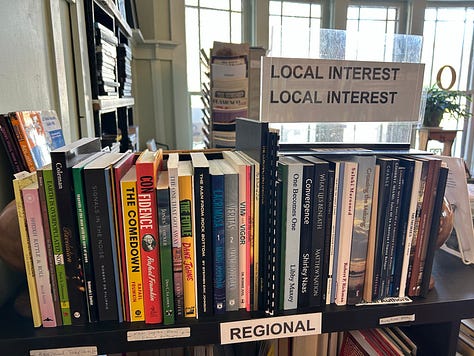

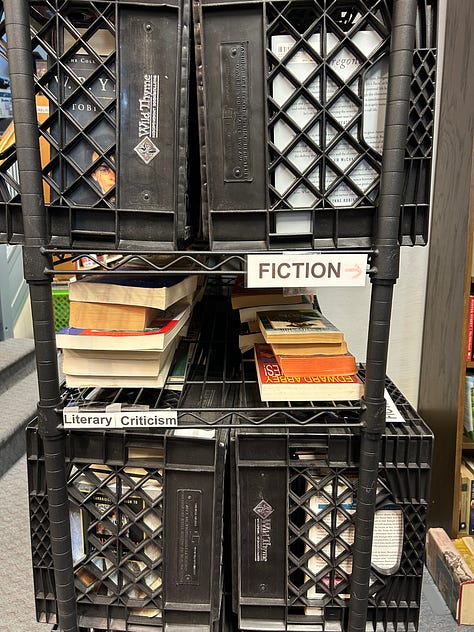
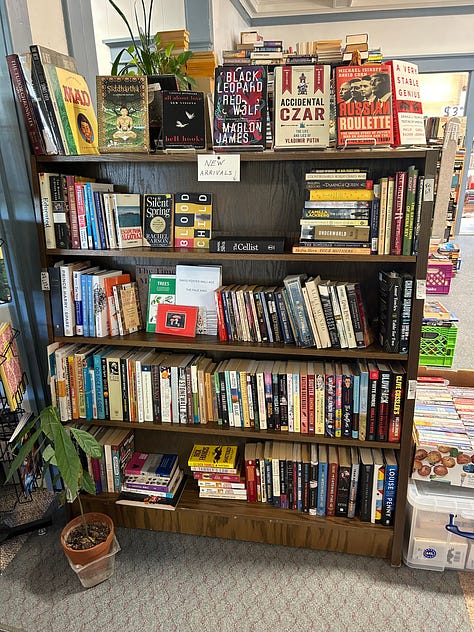
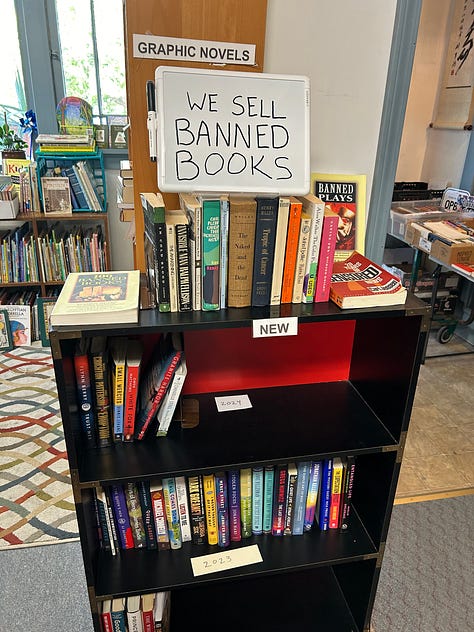
So when Sarah had to run to grab a book for a customer, I interviewed Cathy Field, one of Confluence’s booksellers. Cathy is a talented poet – I loved both poems of hers I found online in Poetry – and a graduate of SIU’s first-ever MFA class (the program was founded in 1995, Cathy told me, and she graduated in 1998). Now that her daughter has begun to work from home and needs less support caring for Cathy’s grandson, Cathy has found herself with a lot more time on her hands. She sat in on poet and SIU faculty member Allison Joseph’s poetry seminar last fall and found herself “highly influenced by the amazing energy of the students, and Allison’s gifts as an instructor.”
“Being a writer, I just love to be around books,” Cathy told me. Like many of the Confluence-affiliated, she and Sarah go way back: in this case, all the way back to protesting U.S. imperialism at the pavilion in downtown Carbondale with the Shawnee Green Party and the local Peace Coalition. The progressive Shawnee Green Party was founded in 1995 by a group of Carbondalians that included Cathy’s late husband. Cathy and Sarah recall the many local demonstrations fondly.
“If I had to recommend one book, it would be Claudia Rankine’s Citizen,” Cathy told me. “I think everyone should read that.”
Cathy’s commitment to community organizing continues unabated. For what it’s worth, she now has my official endorsement for a seat on the Carbondale Elementary School District 95 board.[3]
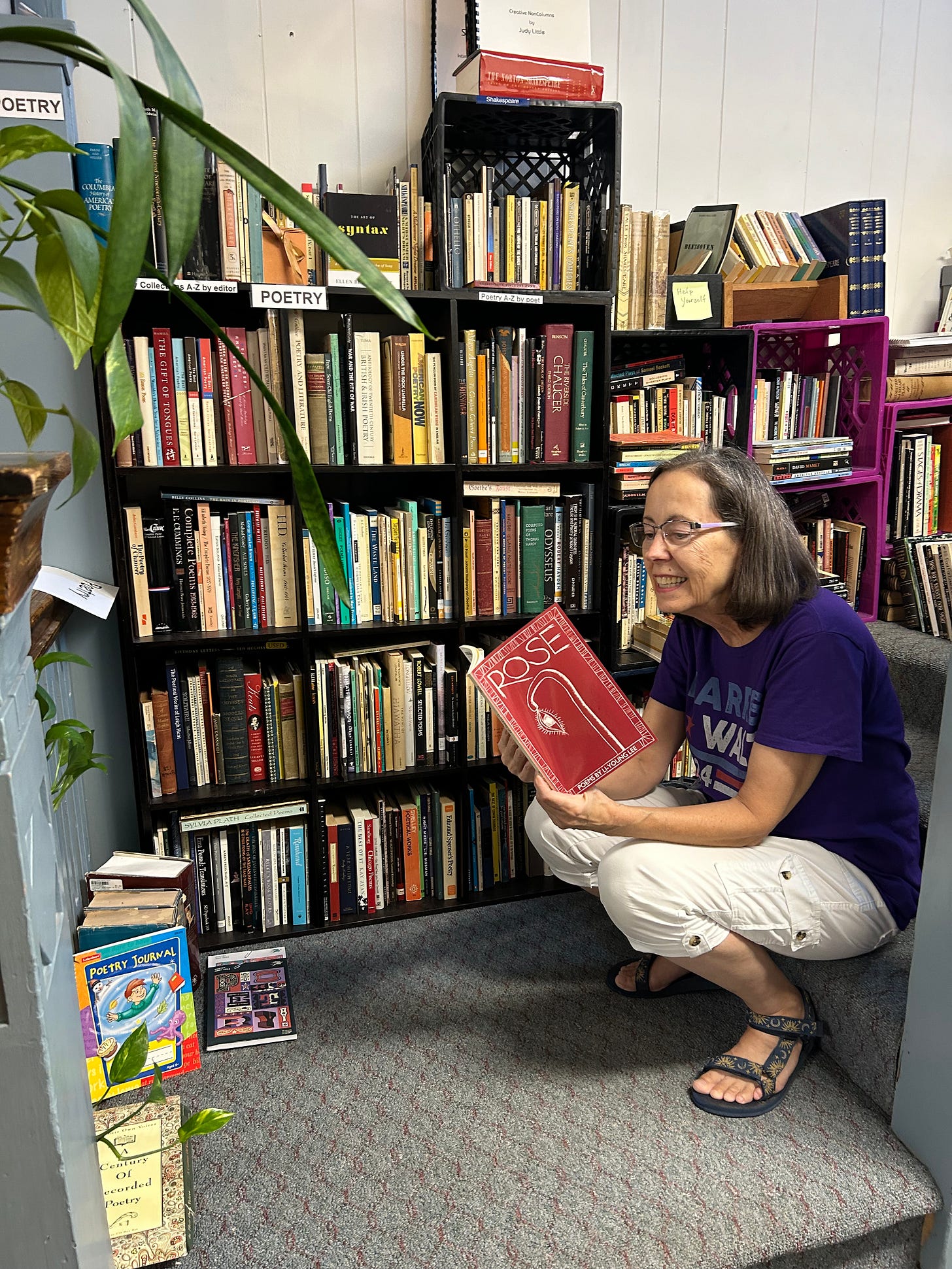
When Cathy was swallowed back into the stream of book-commerce, I struck up a conversation with Mike Hamilton, a wiry man who’s something of a mythical hybrid creature: the cheesy jokes of a dad, the warm good humor of a grandpa, and the fake-obstreperous slapstick of a comedy-uncle.[4]
“I’m a ham,” Mike admitted with a wry shrug. “That why my last name’s Hamilton.”
Like me, Mike is that rare Carbondalian who prefers rural prairieland to the hustle and bustle of Chicago. He moved to southern Illinois from Evanston, a city-adjacent Chicago suburb, a little over ten months ago. When he first beheld Confluence in its flourishing post-COVID state, he was awed. He told me he’d always wanted to own a used bookstore, but had no concept of the organizational work that went into actually running one.
“It used to be that you’d get fifteen or twenty books and bring them up to the counter and the bookseller would take a look at them and say, Okay, that’ll be fifteen dollars,” he said. “Now everything’s in a database, you gotta record all the inventory and prices and so on.”
Mike and I reminisced about eyeballed book stack price estimates – I felt lucky to be able to remember such a time as well – and then he told me that he was the upstairs tenant. As in, Mike lives above a bookstore, a personal dream I’ve had for as long as I can remember. He also functions as the house’s unofficial handyman, a role for which Sarah has granted him a generous reduction in rent.
Mike has been doing a lot of religious and philosophical reading lately, and recommends The Heart’s Shout by Da Avabhasa. Sarah is on a Chaim Potok kick, and Lee has been enjoying Who We Are and How We Got Here: Ancient DNA and the New Science of the Human Past by David Reich.
So there you have it: if you ever find yourself in Carbondale, subscriber, I hope you’ll pay Confluence a visit! (And if you have the chance, try to catch Sarah at her Buck-a-Book sales at the Carbondale Farmer’s Market: all proceeds go to charity!) This is a heartwarming bookstore with a great staff, a place where you can go to remember how things used to be and imagine how things could be, too. It certainly features among the highlights of my time in Little Egypt.

[1] To be honest, Amazon’s All-Conquering Algorithm has since made enthusiastic bedfellows of me and B&N. I’ve even found myself missing Books-A-Million and other brick-and-mortar book-buying chains that I now associate with quainter times, like when we were worried about the president’s pronunciation of the word “strategy” and whether or not millions of computers would be able to accommodate the year 2000.
[2] What’s more, there was no Amazon to drive that bookstore out of business.
[3] Okay fine, I’ll do the millennial snot thing, but only because it’s true this time: Electoral politics has lost the plot, but Cathy Field Hughes must be voted for (and protected) at all costs! Like fr fr, Lisa Simpson meme, etc.
[4] “Cunkle”?


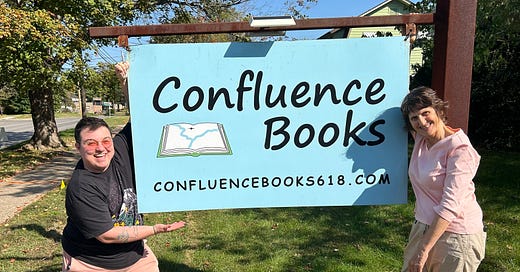




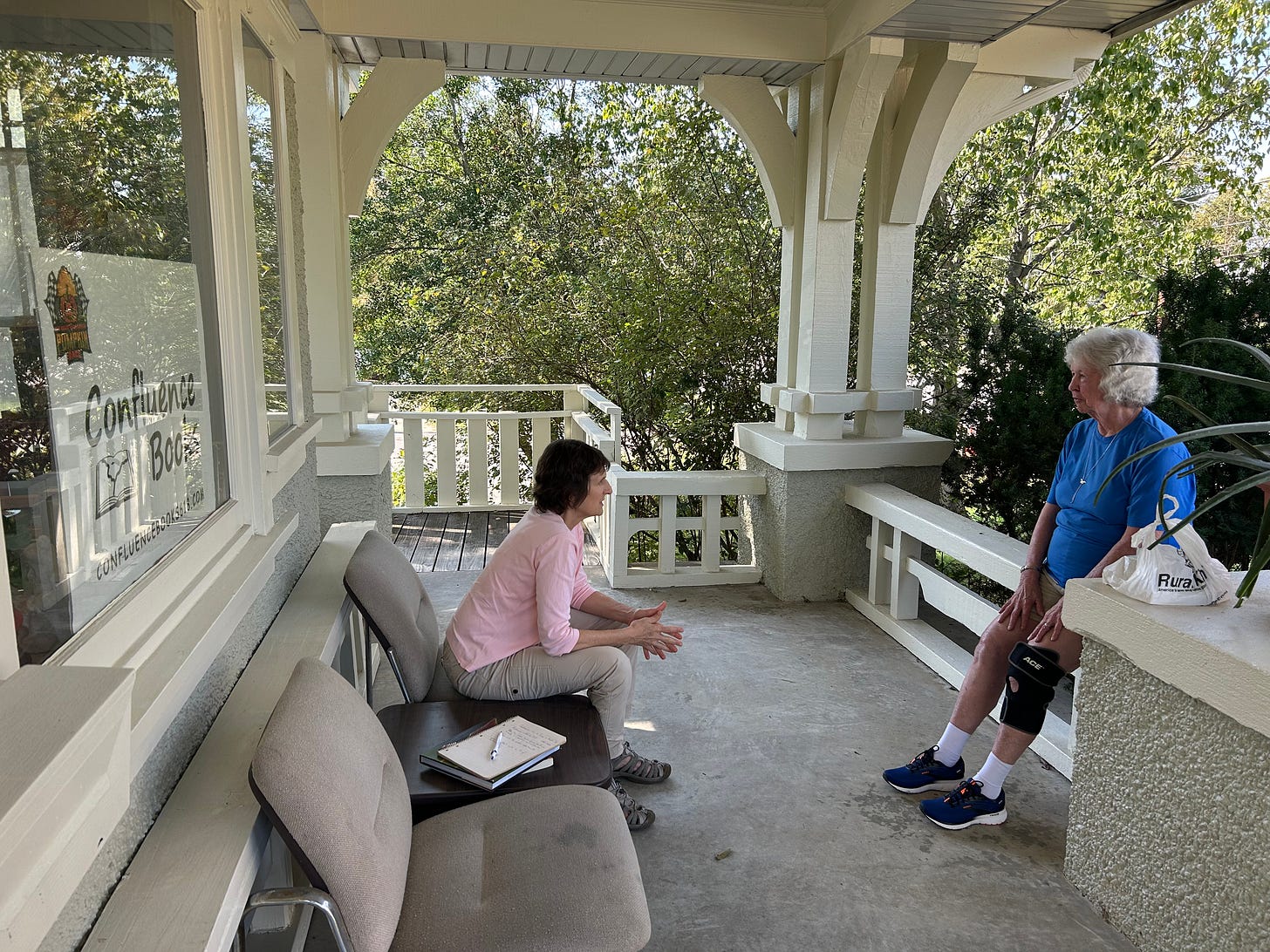
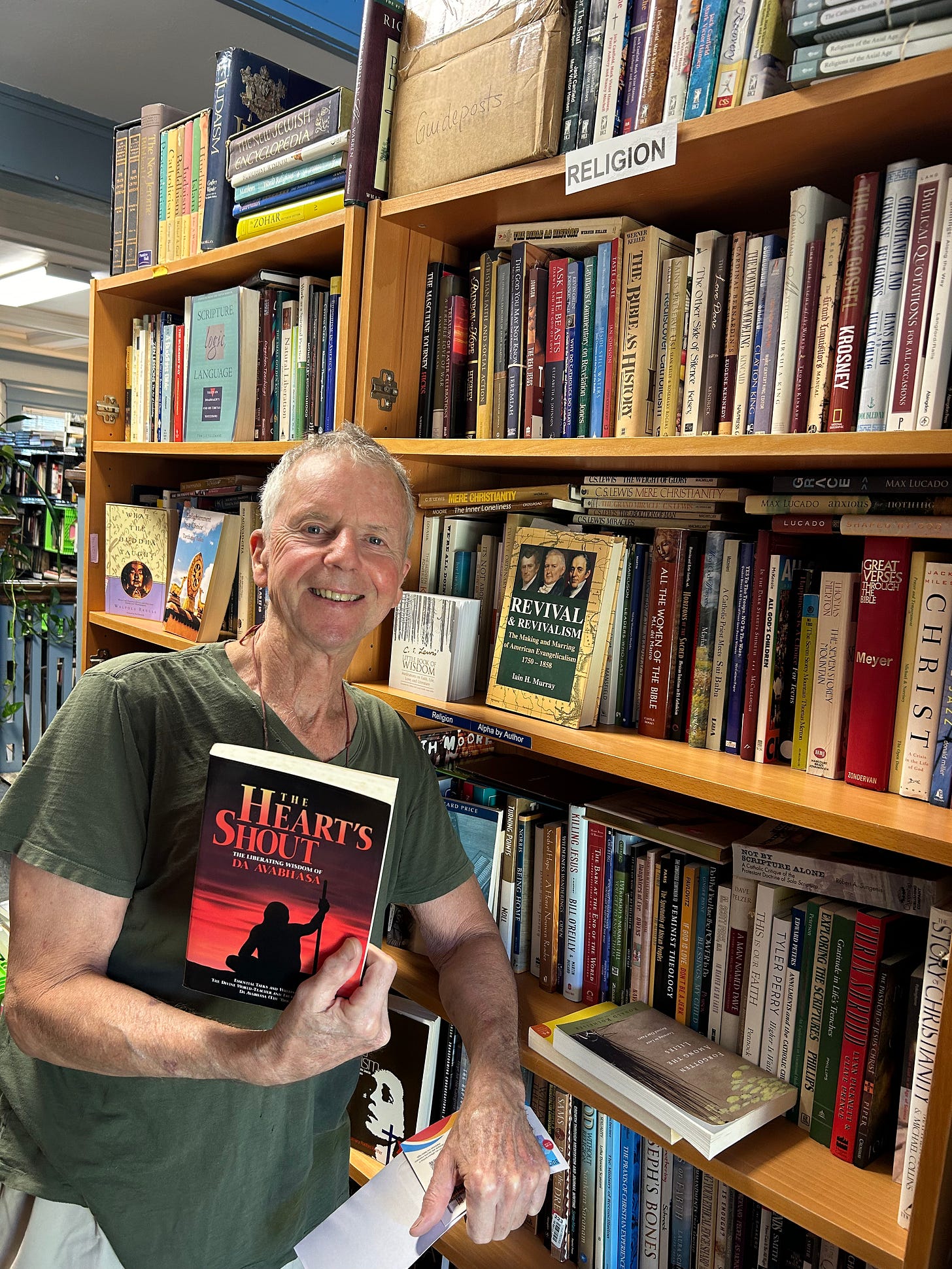
Ha, I moved to Carbondale back in June of this year! *waves* I haven't been to Confluence Books (yet!) because I'm still paying off the moving expenses, but I've visited their booth at the Farmer's Market!